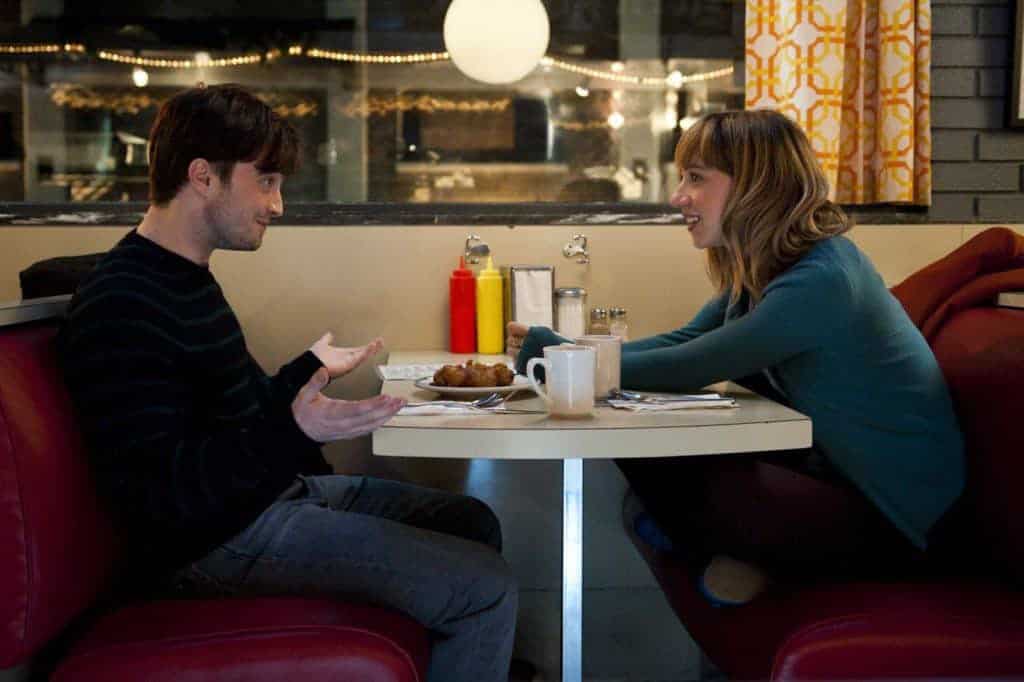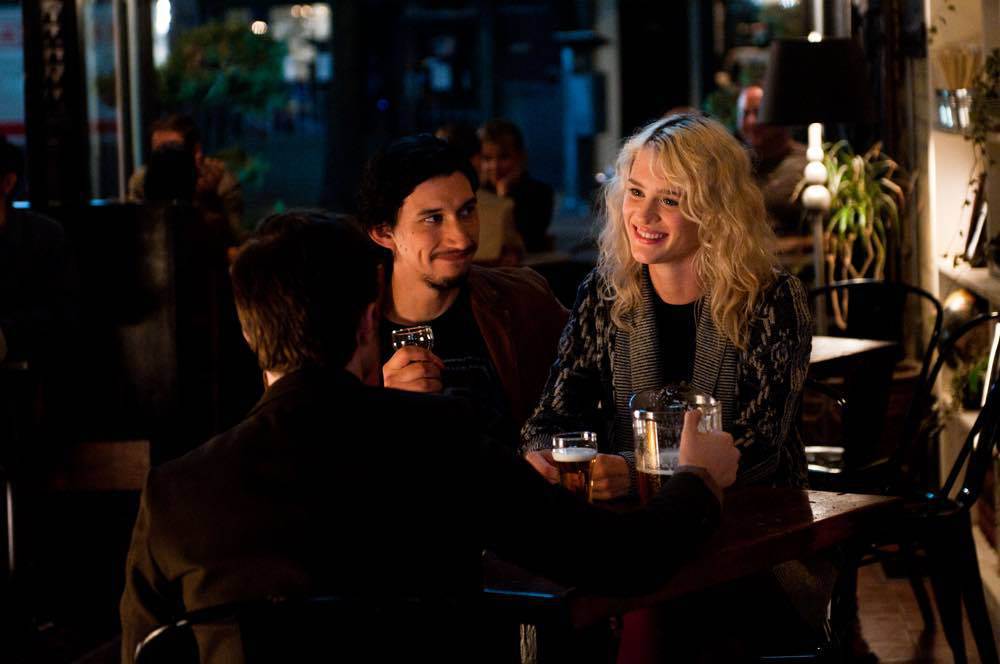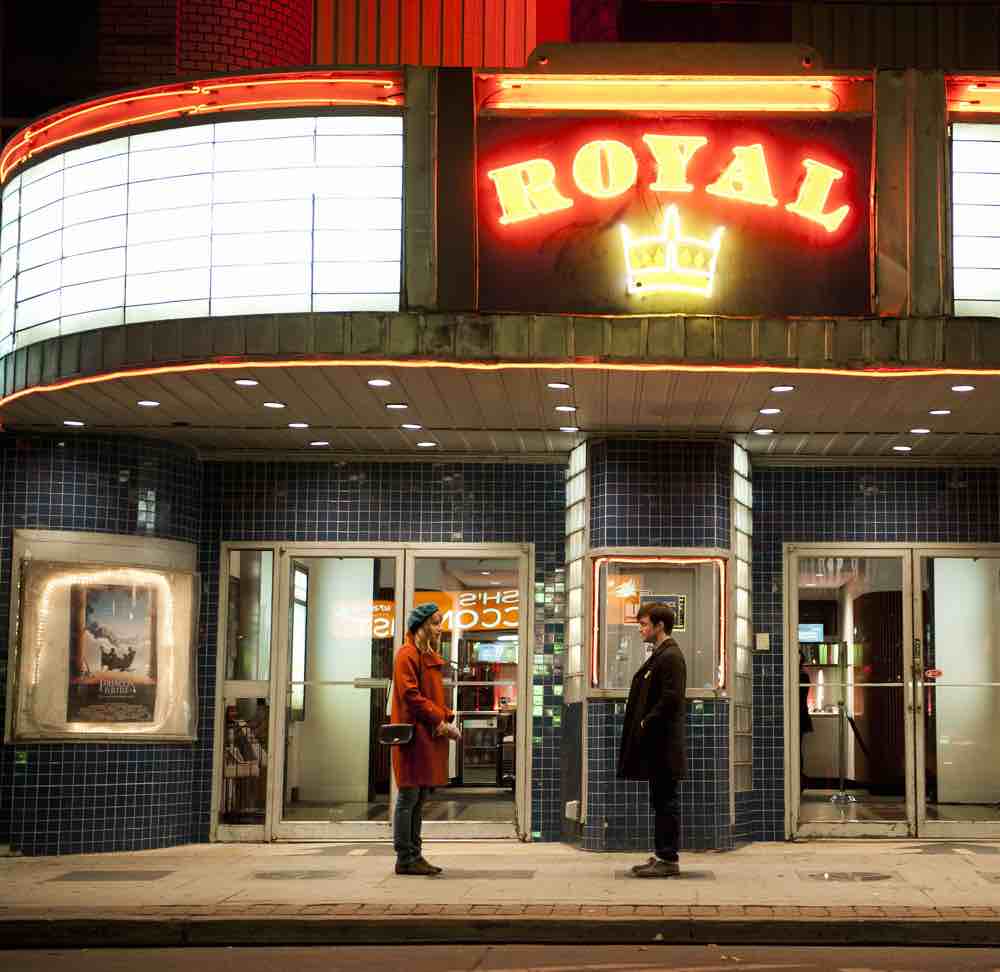Starring Daniel Radcliffe and Zoe Kazan as a pair of Torontonian friends, Michael Dowse’s film The F Word (or What If, as its known stateside) asks, what happens when you meet someone you really connect with, and want to hold onto, when dating isn’t an option?

When Michael Dowse’s smart and entertaining romantic comedy, The F Word, premiered at last year’s Toronto International Film Festival, it was hailed as one of the films (like Villeneuve’s Enemy) ushering in a new era of Canadian cinema: movies with mainstream appeal, featuring international movie stars, that are both shot in and set in Canada. Starring Daniel Radcliffe and Zoe Kazan as a pair of Torontonian friends, The F Word asks, what happens when you meet someone you really connect with, and want to hold onto, when dating isn’t an option? Well, you decide to be friends, with another “F” word lingering in the subtext.
Med-school dropout and current cubicle-occupier Wallace (Daniel Radcliffe) and animator Chantry (Zoe Kazan) meet cute at a party thrown by a shared connection, Wallace’s best friend and college roommate, Allan (Adam Driver), who also happens to be Chantry’s cousin. They bond over magnetic poetry before effortlessly falling into witty, charming banter. Here, as in most of their scenes, they share the screen in a two-shot, foreshadowing their inevitable partnership. After a night of chatter, he walks her home, asks her for her number, and as she hands it over, she casually mentions she has a boyfriend, Ben (Rafe Spall, as a self-absorbed, but decent guy).
There’s clearly a spark between Wallace and Chantry, which movie-goers (and the couple’s friends) can recognize as a romance waiting-to-happen, but the movie plays it straight. Chantry’s in love with Ben, who happens to be a decent guy and UN copyright lawyer, and she’s never left a relationship before it was completely broken. Wallace is still nursing a broken heart from when his last girlfriend (Sarah Gadon) cheated on him, and he realizes that getting between Chantry and Ben is a recipe for disaster. He also just genuinely enjoys her company and conversation, to the point that he’s convinced himself he’s okay with just being friends.
Yes, he pines, and he doesn’t start trying to date anyone else, but he also doesn’t expect that he’ll be rewarded for spending time with her with access to her pants. They both very carefully tiptoe over the line, just enough that they’re almost breaking the rules, but little enough that they’ve still got plausible deniability. When Ben moves to Ireland for his job, and Chantry finds herself wandering the city with Wallace, she’s forced to come to terms with the limitations of her current romantic relationship.

At one point in the film The F Word, Allan and his girlfriend (Mackenzie Davis), who hooked up first and became friends later, make a misguided attempt to help their friends kickstart their romantic relationship. After an evening of skinny dipping, they abandon Wallace and Chantry, on the cold beach, without clothes, and only a sleeping bag for warmth. Rather than getting hot and heavy to keep warm, they fight because they’ve lost their safe boundaries to hide behind. It has the ring of truth.
With his impeccable timing, effortless charm, and devastatingly good looks, Radcliffe proves one of the best leading men of the 21st century. This year, especially, he’s proved he can do much more – from the sensitive and impressionable Allen Ginsberg in Kill Your Darlings, to the feeble-bodied but strong-minded Cripple Billy in Broadway’s The Cripple of Inishmaan, to the young doctor in the dark comedy series “A Young Doctor’s Notebook” – but his very endearing screen presence is something few others can boast. Kazan is equally charming, although we’ve seen her play variations of the hipster artist in “Ruby Sparks” and “Happythankyoumoreplease.”
The supporting cast is equally strong. Fresh off singing in Inside Llewyn Davis and briefly courting Greta Gerwig in Frances Ha, the now ubiquitous Adam Driver proves more than just a plot device for Wallace to sound off. He actually gets one of the film’s best lines, crying with joy: “I just had sex and am about to eat nachos!”. Canadian actress Mackenzie Davis’s character is more transparently written as a plot device, but as in That Awkward Moment, her poise and charm elevate the material.

With its warm colour palette of bright reds, greens, and blues, The F Word – or What If as its been retitled for its US release – brings the same romanticism to Toronto that so many films before it have devoted to Manhattan. The twenty-something hipsters of The F Word spend their afternoons on Queen West, frequent diners in the East End (notably George St Diner), catch movies at The Royal in Little Italy, play ping pong at Spin Toronto, and get married on the Toronto Islands. Toronto hasn’t looked this good on film since Atom Egoyan’s Chloe, but most of that was shot within a two-block radius. Dowse’s canvas is broader, and even more impressively, largely geographically accurate and specific.
While most Canadian films are barely seen by Canadian audiences – both because they’re often esoteric and only in cinemas for a single week – let alone international ones, The F Word had no problem getting international distribution. With its quick wit and accessible storytelling, it’s the sort of film that shouldn’t have trouble finding an audience. The dialogue is more playful than funny – it’s fun without being memorable – but the actors zing their lines back and forth so quickly that it hardly matters.
Yet, for a film that purports to be the Toronto as Toronto romantic comedy (at last!), there’s something very wrong with the fact that the entire cast is white. I mean, does anyone in Toronto have exclusively white friends? Except maybe white supremacists? Toronto prides itself on its multiculturalism, and you’d have to try hard to avoid it. Inter-racial romantic relationships are often the norm, and at minimum, Wallace and Chantry, both educated downtown yuppies, should be expected to have some people-of-colour friends, but they don’t.
In attempting to appeal to a broad – and let’s just say it, American – audience, The F Word is less a portrait of contemporary Toronto than a story that could just as easily be set in the US, but happens to takes place in Toronto. Lack of diversity is a problem in the movies, generally, but with such a homogenous cast, we can’t quite crown The F Word as the reigning “This is so Toronto” romantic comedy.


